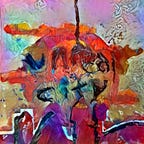Why I Made “The End Of All Our Exploring”
You don’t read a good poem.
A good poem reads you.
There are hundreds of definitions of poetry, but my favourite is that poetry is language made strange.
Language played with; played with until it breaks: abstract nouns twisted into images by the metalepsis of metalepsis called metaphor; grammar twisted into circumlocution by the sheer weight of meanings it was never designed to bear; punctuation pushed into pauses of musical phrasing, not signposts of units of sense.
(Did you see what I did there?)
Poetry is language made strange and a good poem reads you.
Because anything that makes you reconsider anything you thought you knew, even language, also makes you reconsider you.
And we like thinking of ourselves in new ways; we know it’s good for us.
It’s why we like coming home from a holiday.
T.S Eliot, in a poem named after a village that I brought my children up close to, put the idea like this:
“We shall not cease from exploration
And the end of all our exploring
Will be to arrive where we started
And know the place for the first time.
Through the unknown, remembered gate
When the last of earth left to discover
Is that which was the beginning;
At the source of the longest river
The voice of the hidden waterfall
And the children in the apple-tree”
from “Little Gidding” pt. V, the last of The Four Quartets, T.S. Eliot (1943)
@105Collectives’s More Than Glass project https://www.105collective.uk/more-than-glass was about our responses to isolation under Covid-19 and our artistic responses to that isolation.
For me- as a school teacher working from home on full pay, in the company of my grown-up son, home himself from his work as a physicist at CERN in Switzerland- there was no emotional or financial pain in that situation. I want to make it clear that I understand that many people- disproportionately, the most vulnerable and courageous of people- suffered and are suffering still because of the pandemic.
But, even though as I write these words I am in self-isolation having been in close contact with a carrier at work, I personally have not suffered because of the pandemic.
What the pandemic did for me is return me from my exploring to arrive where I started.
Where I started was London in 1970, but I have lived elsewhere all my adult life. I left for university, graduated, travelled for a bit, trained as a teacher, got a job, met a woman, had two children, married her. Then we got divorced at about the same time our kids became grown-ups. So I moved back to London and bought a house, born in the city about a century before I was. A house built for a schoolmaster, next to a school.
The school is a house now, although it’s not really lived in. During the lockdown, the time when I was making my pieces for More Than Glass and that was the subject of More Than Glass, and the first time, I had the opportunity to return from my exploring and arrive where I started. London and schools and childhood.
In other words, I knocked on doors and climbed fences and hacked through brambles and explored my home. And it looked like this, I discovered:
And inside my head, home looked quite like that as well. So I put the two things together with the help of Google Deep Dream and some playing around with digital images, and made this:
I wanted to gesture towards a sundial in a garden, and used a fractal picture of clocks by Angel Glen, who asked only for a credit. All the other images I made for More Than Glass were very time-consuming and laborious; this one was just a joy. I sat at home and looked at what I had in a new way, that made me look at me in a new way, and this image arose as a consequence. This was a healing thing for me, this picture.
My house turned out to be a good poem, because it read me. I really like this image, because I’m a fraud as a visual artist: I think verbally. And this came verbally. It came through thinking about a poem and letting it read me and, if it’s a good anything, it’s a good poem.
And that’s the end of all my exploring.
